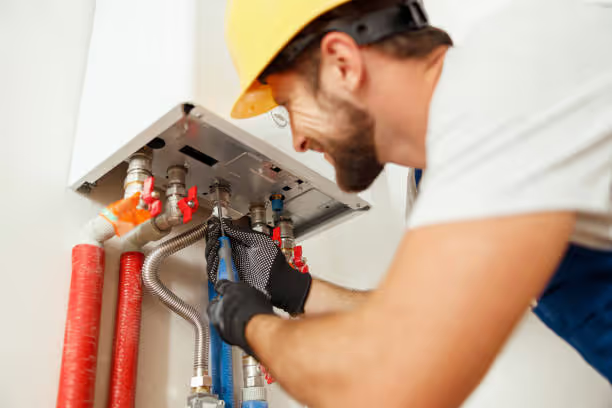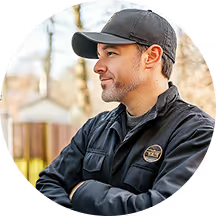Heating Installation in Glen Cove, NY
Installing a new heating system is one of the most impactful upgrades you can make for comfort, efficiency, and long-term energy costs in Glen Cove, NY. Homes on the North Shore of Long Island face cold, damp winters and variable coastal conditions, so a properly sized, well-installed system matters more here than in milder regions. This page explains the full heating installation process, common local considerations, system choices, ductwork and hydronic options, professional installation steps, testing and commissioning, homeowner orientation, and post-installation support and warranties.

Why a proper heating installation matters in Glen Cove
Glen Cove homes vary from older colonials and waterfront properties to modern townhouses. Many older houses have undersized equipment, antiquated boiler-radiator systems, or poorly sealed ductwork. Coastal humidity can drive corrosion and heat loss, while narrow lot lines and space constraints may limit equipment placement. Correct installation ensures even comfort, lower energy bills, safer operation, and equipment longevity in these local conditions.
Common heating installation scenarios in Glen Cove
- Replacing an old gas furnace that no longer reaches set temperatures
- Upgrading a cast-iron boiler to a high-efficiency condensing boiler or converting to a heat pump system
- Installing a ductless mini-split for additions, garages, or rooms without ductwork
- Installing or resizing ductwork in older homes with inadequate air distribution
- Switching from oil-fired systems to natural gas or electric heat pumps to reduce maintenance and emissions
- Adding zoning or a smart thermostat to manage multiple living spaces or rental units
Consultation and load calculation
Every professional installation starts with an on-site consultation and load calculation. That includes:
- A Manual J heat loss/load calculation to size the system based on insulation, window types, orientation, foundation and wall construction, and local climate data for Glen Cove.
- A walkthrough to document existing ductwork, boiler piping, venting, combustion air, equipment clearances, and utility access.
- Discussion of homeowner priorities: lowest operating cost, quiet operation, multi-zone control, or minimal remodeling.
Proper sizing avoids the common local mistakes of oversizing (short cycles, higher bills, premature wear) or undersizing (poor comfort, frozen pipes risk). For multi-level or waterfront homes, load calculations typically reveal significant variance between zones that zoning and variable-speed equipment can address.
Choosing between furnace, boiler, and heat pump
- Gas or electric furnaces: Efficient modern furnaces (high AFUE ratings) are compact and provide fast warm air. Best for homes with existing duct systems and where natural gas is available.
- Boilers and hydronic systems: Hydronic heat provides even, quiet warmth and works well in older Glen Cove homes with baseboard radiators or radiant floors. Condensing boilers offer high efficiency, especially for low-temperature radiant systems.
- Heat pumps (air-source, cold-climate, or mini-splits): Heat pumps are increasingly viable on Long Island due to improved cold-climate models. They deliver efficient heating and cooling in a single system and can qualify for incentives. For Glen Cove winters, cold-climate heat pumps paired with a backup heat source or hybrid system can be very effective.
Factors to weigh: existing ductwork, fuel availability, basement or crawl space layout, noise preferences, indoor air quality goals, and long-term operating cost projections for Glen Cove weather.
Ductwork and hydronic piping considerations
- Ductwork: Older ducts often leak, are undersized, or lack insulation. Professional evaluation includes airflow measurement, sealing, insulation, and sometimes re-routing or upsizing. New ducts should follow Manual D design for balanced distribution.
- Hydronic piping: For boiler replacements, pipe layout, expansion tank sizing, pump selection, and zone control matter. Choices include PEX vs copper piping, wet vs dry returns, and appropriate mixing valves for radiant systems.
- Space and access: Coastal and older homes may require creative routing, compact equipment, or relocation to utility closets while staying compliant with local code and clearance requirements.
Professional installation steps
- Site prep and permit pull: Installation begins with obtaining required permits and scheduling inspections with the Glen Cove/Nassau County building department.
- Removal of old equipment: Safe disconnect and proper disposal of old furnaces, boilers, tanks, or refrigerant in accord with regulations.
- Rough-in work: Venting, gas lines, electrical disconnects, concrete pads or curbs, and any duct or piping modifications.
- Equipment placement and hookup: Mounting the new unit, connecting gas, electrical, fuel, refrigerant lines or hydronic piping, and installing controls and thermostats.
- Safety and code checks: Venting, combustion air, condensate drainage, and clearances verified to code.
Technicians follow manufacturer installation guidelines and local code to protect warranties and ensure safe, reliable operation.
System testing and commissioning
Thorough testing is essential for long-term performance:
- Combustion analysis and CO checks for gas appliances
- Pressure and leak testing for refrigerant and hydronic systems
- Airflow measurements and duct balancing for forced-air systems
- Refrigerant charge verification and superheat/subcooling checks for heat pumps
- Delta T testing across coils and radiators to confirm heat transfer
- Control and safety device testing including pressure relief valves, limit switches, and emergency shutoffs
Commissioning includes a documented checklist and baseline performance readings that owners should keep for warranty and future maintenance reference.
Homeowner orientation
After installation and testing, the homeowner receives a walkthrough that covers:
- Thermostat programming and zoning operation
- Filter types, locations, and replacement frequency
- Basic maintenance tasks: condensate pan checks, vent clearance, and outdoor unit protection in coastal conditions
- Emergency shutoff procedures and what to expect during normal startup
- Explanation of warranty coverage and recommended maintenance schedule
This hands-on orientation ensures you know how to get the best performance and avoid common problems in Glen Cove homes.
Post-installation support and warranties
Installed systems typically include both manufacturer warranties and labor guarantees. Good post-installation support includes:
- Registration of equipment with the manufacturer
- Delivery of warranty paperwork and service plan recommendations
- Availability of seasonal maintenance plans to preserve efficiency and warranty compliance
- Guidance on local permit and inspection documentation retained for resale or audits
Local environmental conditions in Glen Cove make routine maintenance important to prevent corrosion, condensate issues, and efficiency loss.
Long-term benefits and maintenance tips
A professionally installed heating system delivers:
- Consistent comfort across zones and levels
- Lower energy bills through correct sizing and high-efficiency equipment
- Extended equipment life with proper commissioning and maintenance
- Improved indoor air quality with correctly sized filtration and ventilation
Simple tips for Glen Cove homeowners:
- Schedule annual heating tune-ups before the heating season
- Keep outdoor units clear of debris and salt spray where applicable
- Replace filters regularly and use media filters for improved IAQ
- Consider zoning or smart thermostats for better control and savings
- Ask about available incentives or rebates that apply to high-efficiency heat pumps or boilers in your area
A careful, local-aware installation is the foundation of a reliable, efficient heating system for Glen Cove homes. Proper planning, professional execution, and ongoing care protect your investment and keep your home comfortable through the coldest months.
Customer Testimonials
Hear directly from homeowners who trust Bobby O’s HVAC Inc. for fast response times, honest service, and lasting comfort.











